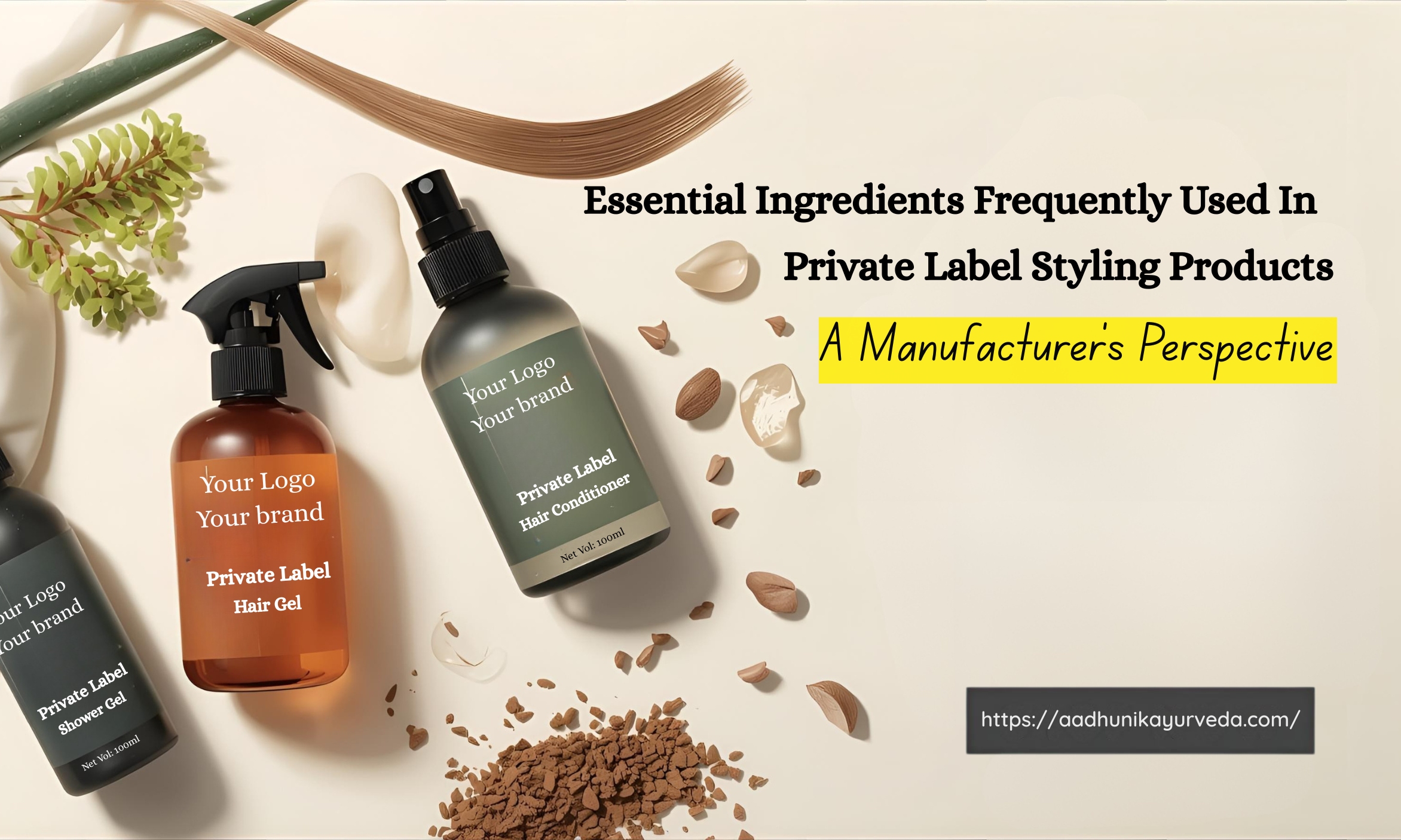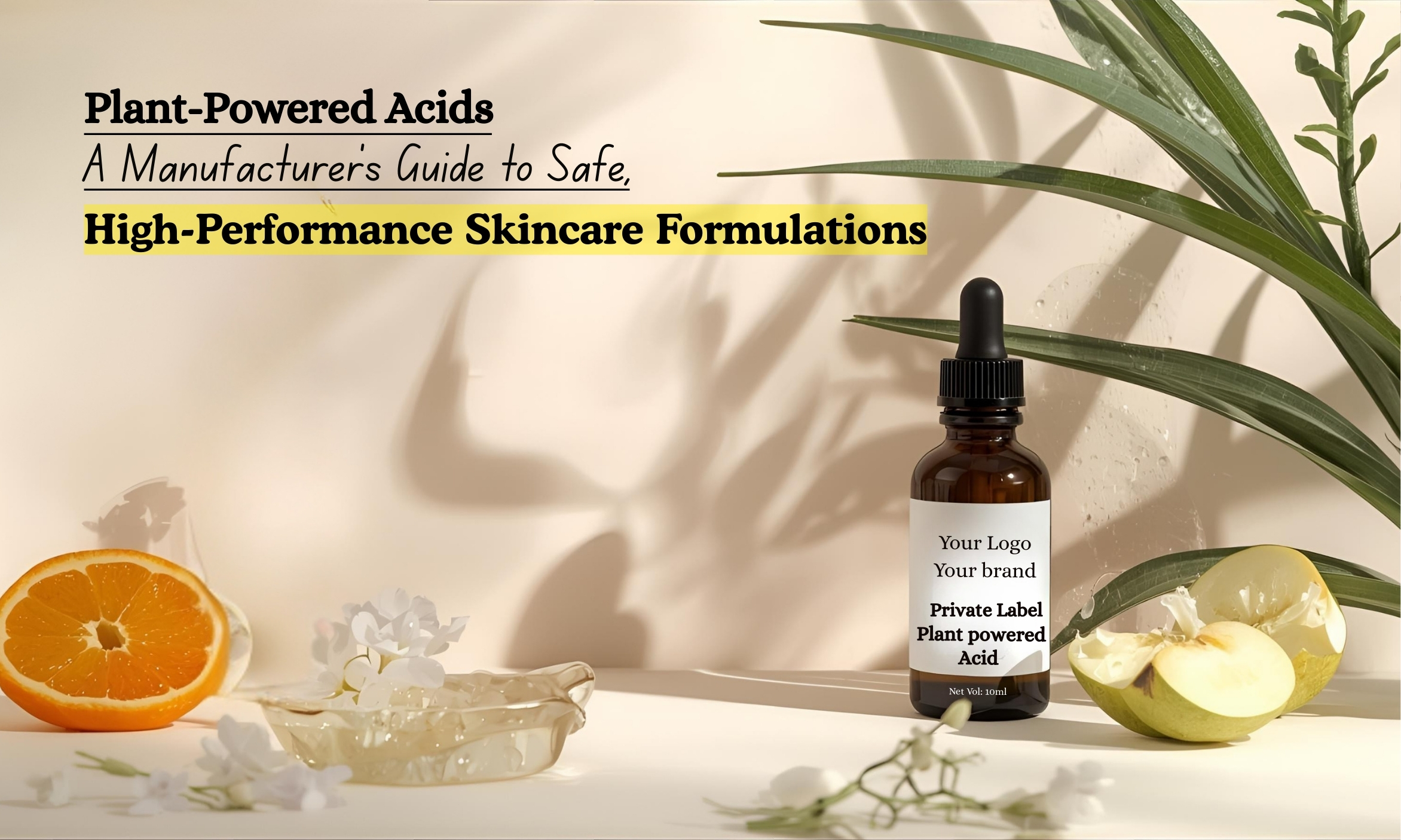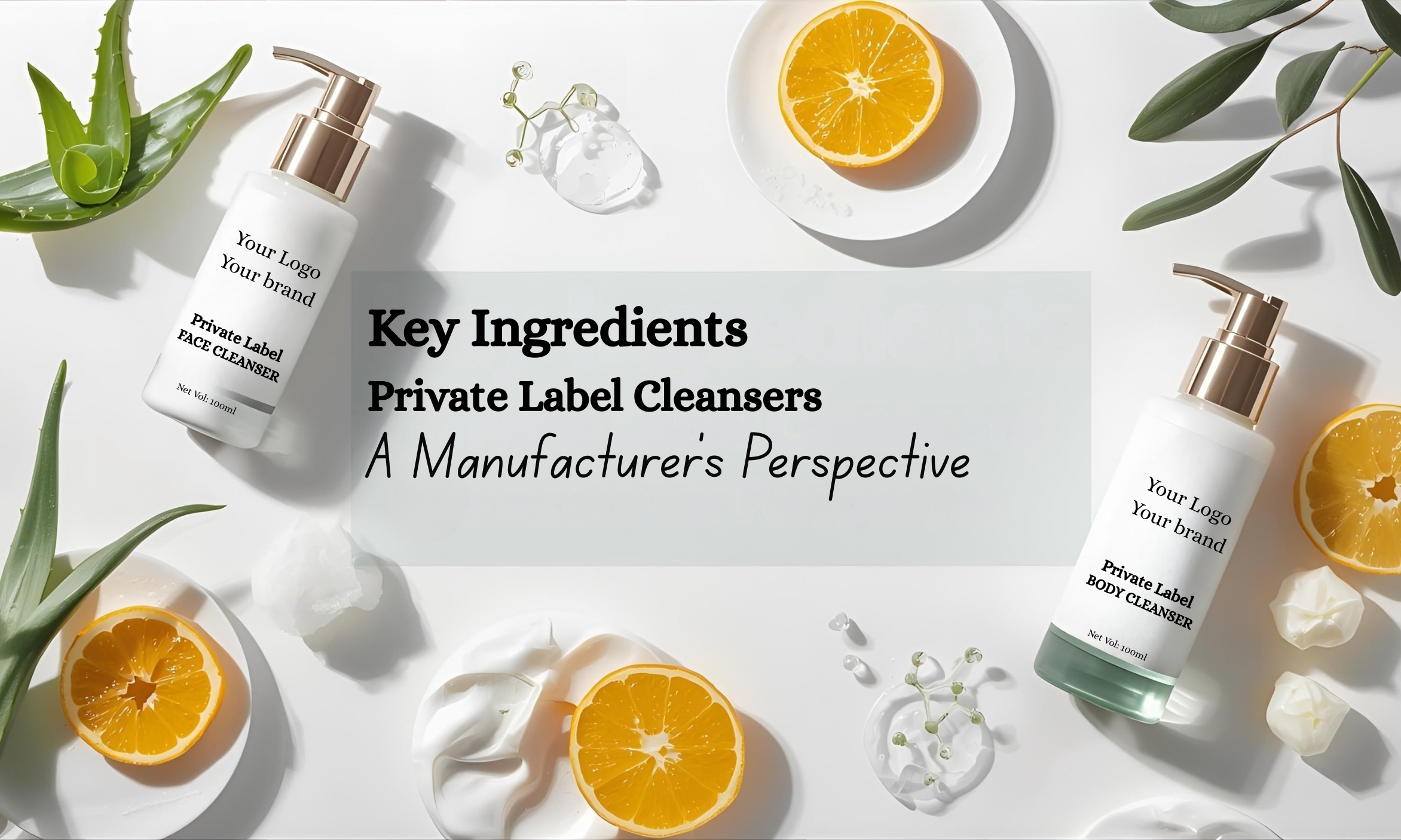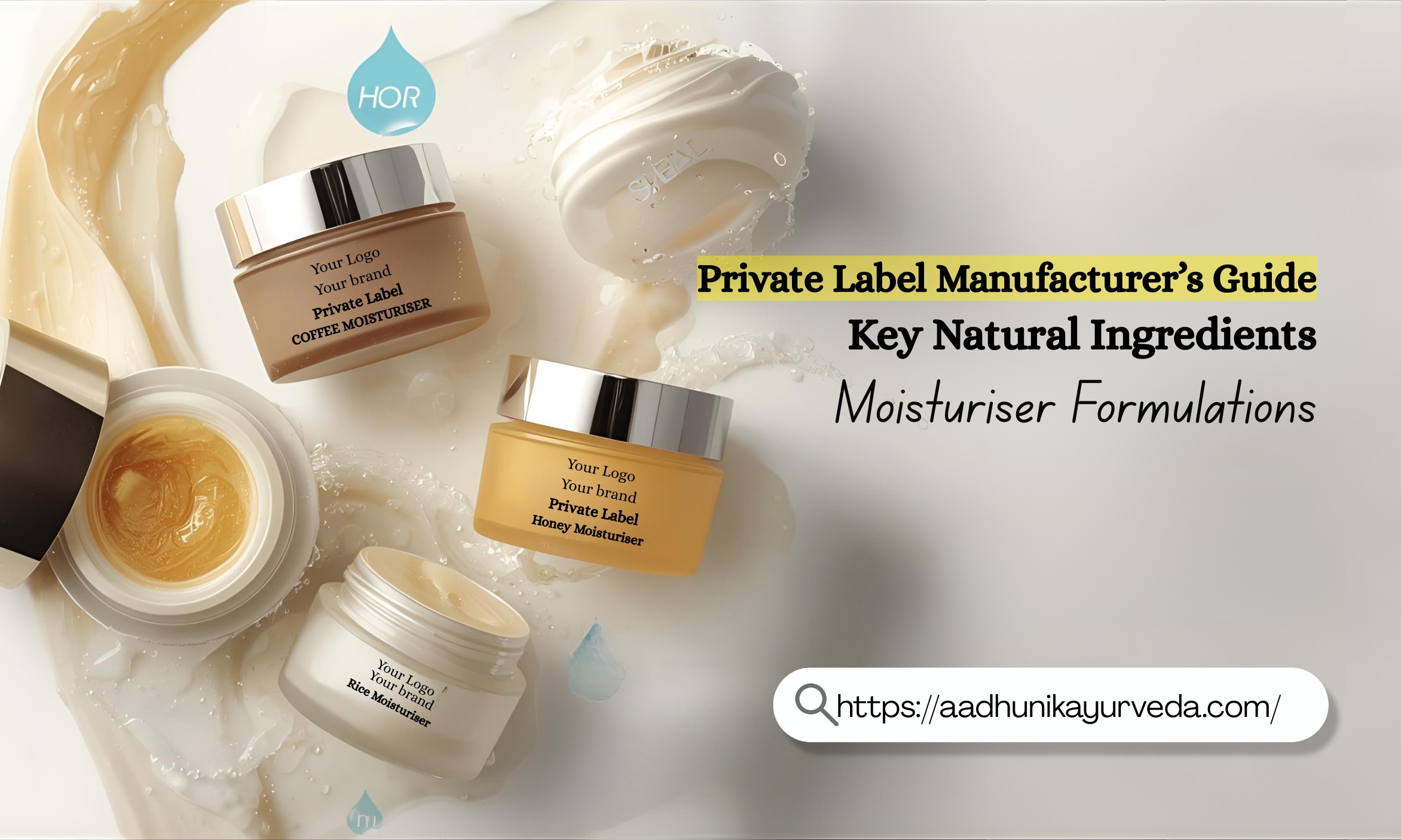
Essential Ingredients Frequently Used in Private Label Styling Products: A Manufacturer’s Perspective
Essential Ingredients Frequently Used in Private Label Styling Products: A Manufacturer’s Perspective | What Are Natural Hydrosols? | Why Hydrosols Are Trending in Skincare | How Hydrosols Enhance Skincare Formulations | Role of a Hydrosol Manufacturer India in Skincare Development | Choosing the Right Floral Water Supplier India | Partnering with a Face Toner Manufacturer IndiaHair styling products are no longer just about holding hair in place, today’s consumers demand performance and wellness in the same formulation. Whether it’s a gel, cream, mousse, or serum, buyers expect products that deliver shine, control frizz, improve manageability, and at the same time nourish the hair and scalp. This shift has transformed the way private label manufacturers like us design styling solutions.
The global beauty and haircare market is rapidly moving towards plant-based, clean-label, and chemical-free alternatives. Consumers are scrutinizing labels, looking for transparency and natural ingredients over synthetic silicons, harsh polymers, and petrochemicals that dominated conventional styling products. For brands, this means that ingredient selection is now the backbone of market success.
As a private label manufacturer, our role goes beyond simply mixing ingredients. We focus on sourcing authentic botanicals, identifying natural alternatives to synthetics, and creating stable yet effective styling formulations that perform well in diverse hair types and climates. In this guide, we’ll walk you through the key ingredients frequently used in styling products,, how they function, why brands choose them, and the manufacturer insights that shape clean and high-performing private label styling solutions.
The Role of Ingredients in Styling Products
Unlike shampoos that primarily cleanse and conditioners that focus on nourishment, styling products need to deliver instant results that are visible to the consumer. From providing volume and texture to controlling flyaways and offering long-lasting hold, every ingredient plays a strategic role in ensuring the product meets expectations.
From a manufacturer’s perspective, three crucial considerations define ingredient use in styling products:
- Performance & Safety Balance: Styling products should provide hold, shine, and manageability without leaving residue, stickiness, or causing scalp irritation.
- Natural Alternative Integration: With rising demand for natural formulations, synthetics such as silicones and parabens are being replaced with jojoba oil, aloe vera, plant proteins, and glycerin that provide similar results but in a cleaner way.
- Customization for Brand Identity: Depending on the brand’s positioning (organic luxury vs. affordable clean-label), ingredient selection and concentration are adjusted to create a unique formulation.
This is why ingredient selection is not random, it is a science backed by market trends, technical knowledge, and consumer preferences.
Ingredients Frequently Used in Styling Products
Below are the most effective and frequently used ingredients in styling products, explained in three parts:
Aqua (Water)
- Benefits: Acts as the universal solvent, enabling the blending of oils, proteins, and conditioning agents. It ensures hydration, spreadability, and lightweight texture in styling products.
- Why Brands Choose It: Water-based styling products are lighter and more acceptable to consumers than heavy oil-only formulas. It creates a refreshing application experience.
- Manufacturer Insight: We prioritize purified, demineralized water to prevent impurities. In water-conscious formulations, we also offer waterless alternatives using aloe vera juice or hydrosols.
Silk Amino Acids
- Benefits: Penetrate deeply into hair strands, improving elasticity, smoothness, and shine. They help repair damaged cuticles and prevent breakage.
- Why Brands Choose It: Offers premium appeal in styling products, as “silk-infused” resonates with consumers looking for luxury and softness.
- Manufacturer Insight: We source silk amino acids from sustainable processes. For vegan alternatives, we use plant-based hydrolyzed proteins derived from rice or oats.
Simmondsia Chinensis (Jojoba) Seed Oil
- Benefits: Mimics the scalp’s natural sebum, controlling frizz, adding shine, and preventing dryness. Excellent for lightweight styling products.
- Why Brands Choose It: Recognized as a premium botanical oil with strong consumer demand for natural shine enhancers.
- Manufacturer Insight: We cold-press jojoba oil to retain nutrients. It serves as a natural alternative to silicones, delivering shine without buildup.
Aloe Barbadensis (Organic Aloe Vera) Leaf Juice
- Benefits: Hydrates hair, soothes scalp, reduces frizz, and provides natural slip for easy styling.
- Why Brands Choose It: Aloe is a consumer-favorite for hydration and scalp care, enhancing brand appeal in “natural” hair styling ranges.
- Manufacturer Insight: We use organic aloe vera juice instead of synthetic gums. Aloe also works as a base liquid, reducing reliance on plain water.
Cetrimonium Chloride (Conditioning Agent)
- Benefits: Provides anti-static properties, improves detangling, and adds softness. It helps distribute styling product evenly.
- Why Brands Choose It: Enhances performance, especially in leave-in styling creams and detanglers.
- Manufacturer Insight: While cetrimonium chloride is widely used, we prefer plant-based cationic conditioners as natural alternatives for eco-conscious brands.
Hydrolyzed Wheat Protein
- Benefits: Strengthens hair, boosts volume, and reduces porosity by repairing damaged cuticles. Improves hair’s ability to retain moisture.
- Why Brands Choose It: Highly popular in “protein-enriched” styling products for strengthening and thickening claims.
- Manufacturer Insight: We use non-GMO, hydrolyzed wheat protein. For gluten-free brands, we recommend hydrolyzed rice protein as an effective alternative.
Vegetable Glycerin
- Benefits: Acts as a humectant, drawing moisture into the hair shaft, keeping it hydrated and frizz-free.
- Why Brands Choose It: Loved by consumers for enhancing softness, curl definition, and hydration.
- Manufacturer Insight: We source plant-derived glycerin from coconut or soy. Unlike synthetic humectants, natural glycerin ensures gentle, scalp-safe hydration.
Natural Alternatives to Synthetics in Styling Products
Traditional styling relied heavily on silicones, parabens, and synthetic polymers for shine and hold. Today, brands are moving towards botanical alternatives.
- Instead of silicones → Jojoba Oil and Aloe Vera provide shine and smoothness.
- Instead of synthetic cationic conditioners → plant-based conditioning agents ensure softness.
- Instead of artificial humectants → vegetable glycerin and aloe provide natural hydration.
Manufacturer Insight: Our approach is to avoid synthetic fillers and instead leverage multifunctional botanicals that provide performance while being label-friendly.
Private Label Styling Product Range
As a manufacturer, we help brands develop tailored private label products that meet diverse consumer needs. Some of the most popular styling product ranges include:
- Private Label Natural Aloe & Jojoba Styling Gel
- Private Label Curl Defining Cream with Shea Butter & Aloe Vera
- Private Label Volumizing Rice Protein Hair Mousse
- Private Label Hydrating Leave-In Styling Spray with Aloe & Glycerin
Balancing Performance & Safety in Styling Formulations
For manufacturers, the challenge is ensuring styling products perform well without compromising safety. Performance depends on achieving the right balance of:
- Proteins (strengthening and repairing).
- Oils (shine and frizz control).
- Humectants (hydration and softness).
- Conditioners (manageability and detangling).
We carefully test for stability, ensuring products don’t separate, leave residue, or cause scalp irritation. Patch testing and microbial safety checks are integral parts of our process.
Trending & Effective Ingredients in Styling Products (2025 and Beyond)
As consumer preferences evolve, certain ingredients are gaining traction in modern styling solutions:
- Plant Proteins (Rice, Oat, Pea): Clean-label strengtheners.
- Botanical Oils (Jojoba, Argan, Hemp): Natural alternatives to silicones.
- Aloe & Hydrosols: Hydrating bases replacing plain water.
- Multifunctional Botanicals: Ingredients like aloe that act as both humectant and soothing agent.
Manufacturer Insight: We continuously adapt formulations to align with market trends and consumer expectations, ensuring brands stay ahead.
Customization for Private Label Brands
Every brand has a unique identity, and customization is key to differentiation:
- Performance Variants: Lightweight styling sprays, strong-hold gels, curl definers, or nourishing serums.
- Targeted Formulations: Anti-frizz, volumizing, color-safe, or scalp-friendly styling ranges.
- Brand Storytelling: Using natural oils, proteins, and hydrosols as marketing highlights.
Manufacturer Insight: We offer end-to-end customization, from selecting hero ingredients to eco-conscious packaging.
Manufacturer’s Insight
- Ingredient Sourcing: Direct from farmers and ethical suppliers.
- Certifications: Organic, cruelty-free, and clean-label compliance.
- Quality Assurance: Lab tests for purity, potency, and stability.
- Scalable Production: Catering to both startups and established global brands.
Conclusion
The future of hairstyling lies in natural, safe, and effective formulations. With ingredients like jojoba oil, aloe vera, hydrolyzed proteins, and plant-based alternatives to synthetics, brands can deliver products that combine performance with consumer trust.
As a private label manufacturer, our mission is to help brands bring these innovations to market, ensuring every styling product is not just functional, but also sustainable, safe, and aligned with global beauty trends.
FAQs:
What makes natural styling product formulations better than synthetic ones?
Natural formulations provide performance without side effects like buildup or scalp irritation. Consumers also trust botanical ingredients more, making it easier for brands to market clean-label styling products.
Can styling products deliver strong hold without harsh chemicals?
Yes. Using plant proteins, natural conditioning agents, and botanical oils, we design styling solutions that give both strong hold and flexibility, without relying on synthetic resins.
How do you ensure ingredient quality and consistency?
We source directly from trusted suppliers, run lab tests for purity, and maintain batch-to-batch consistency through strict quality control protocols. This ensures your private label products remain reliable.
Can I launch a customized styling product under my private label brand?
Absolutely. We offer complete customization – from selecting hero ingredients to deciding texture, fragrance, and packaging. Whether you need curl enhancers, serums, or sprays, we create formulations to match your vision.
What certifications do natural styling products require?
Depending on your market, certifications may include Organic, FDA, MOCRA compliance, Cruelty-Free, or Vegan certifications. We guide brands through the certification process to ensure regulatory compliance.


